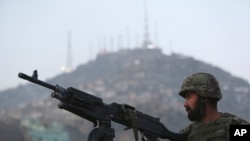Pakistan says its anti-terrorism campaign is focused on all militant outfits operating in the country, without distinguishing between “good” and “bad” Taliban. Adviser on national security and foreign policy, Sartaj Aziz, in an interview tells VOA the policy has resulted in improved counter-terrorism cooperation with neighboring Afghanistan.
Since the visit of new Afghan President Ashraf Ghani to Pakistan last month, both sides have reported increased economic and security cooperation to promote regional peace efforts. Pakistani adviser on national security and foreign policy Sartaj Aziz says the recent attack on a military-run school in Peshawar was the first incident to test the resolve of the two countries to jointly take on militants threatening them.
The brutal school assault carried out by seven suicide bombers killed 150 people, mostly children. The Pakistani Taliban claimed responsibility.
Aziz tells VOA that Islamabad swiftly shared evidence on the handlers in Afghanistan of the brutal school attack with Kabul at the highest level and Afghan authorities responded appropriately.
“This was the first sort of event which called upon that mechanism to come into place," said Aziz. "So, there were very high-level exchanges between the two countries and, therefore, a coordinated action was taken. And I think in the next few weeks the mechanism will be further strengthened and therefore I hope that in future we will be able to deal with such events even more systematically and more rapidly. But it is a good indication that the cooperation that had started after the President Ghani’s taking over is now taking shape.”
Leader of the Pakistani Taliban, Mullah Fazlulllah, has allegedly taken shelter in areas around the eastern Afghan province of Kunar after fleeing military operations across the border. Afghan security forces started conducting offensives in the area soon after the Peshawar attack, killing many fugitive insurgents.
For many years, Afghanistan has urged Pakistan to deny sanctuaries to the Afghan Taliban and its ally, the Haqqani Network involved in deadly attacks against local and U.S.-led international forces. It has been alleged for some time that while the Pakistan military is attacking the Pakistani Taliban waging an insurrection against the country, they are not denying sanctuaries to the Afghan Taliban because they do not pose a threat to Pakistan and instead could be used to counter rival India’s influence in the conflict-torn country. Afghan authorities even have linked a recent spike in deadly insurgent attacks in and around Kabul to militants hiding on the Pakistani side of the border.
But Sartaj Aziz suggests his government has long abandoned the policy of “good” and “bad” Taliban.
“We are not making any distinction (between good and bad Taliban) and I think this questions does not arise that we are helping anybody as far as attacks (in Afghanistan) are concerned," said Aziz. "(But) even now in the Afghan media sometimes, any (insurgent) activity that takes place (in Afghanistan), fingers are pointed at Pakistan but we are doing our best to dispel such impression because we have no interest in creating instability in Afghanistan. In fact, stability in Afghanistan is absolutely critical for Pakistan’s own stability. So, I think these are past perceptions and some of them still linger on.”
Afghan and U.S. officials believe top leadership of the Haqqani network remains in Pakistan after moving out from their safe haven in North Waziristan where a major counter-insurgency operation has been under way since this past June. Aziz did not rule out the possibility that some Afghan militants may have taken shelter in parts of Pakistan before the Waziristan offensive was launched, citing the mountainous terrain.
Pakistan has long insisted that the Afghan Taliban is a stake holder in the peace and reconciliation efforts in Afghanistan. However, Aziz appears to be backing away from his country’s traditional stance that used to be a major irritant in bilateral ties.
“I think it is for Afghanistan to decide and my own feeling is that President Ashraf Ghani has invited them for a dialogue," said Aziz. "Some have responded some have not, so I think the process has to be allowed to continue. We can of course support the process to the extent we can by sharing information by sharing advice.”
The United States also acknowledges the positive trend and increased cooperation between Pakistan and Afghanistan and has promised to continue its support in bringing the two even closer to ensure regional peace.
Following the withdrawal of the bulk of international forces from Afghanistan by the end of this month, analysts see often rocky ties between Islamabad and Kabul transitioning from a relationship of mistrust into greater counter-terrorism cooperation and restoration of mutual trust.




